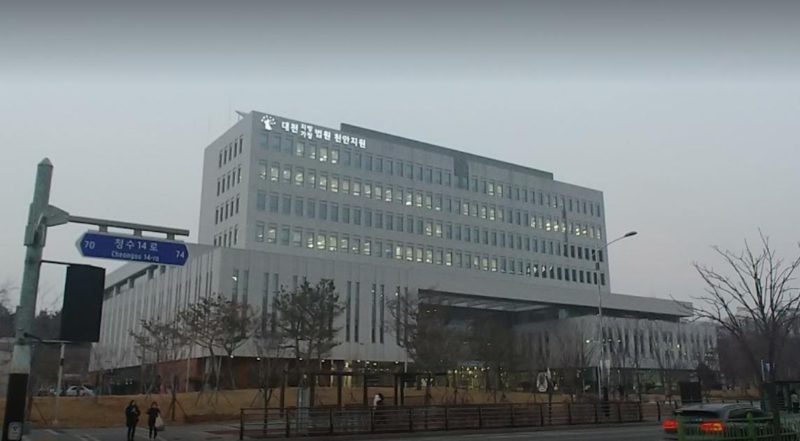World
South Korea court orders trans sergeant reinstated in posthumous ruling
Byun Hui-su was first active duty soldier to have sex reassignment surgery

Republic of Korea (ROK) Army Staff Sgt. Byun Hui-su was a tank driver who simply wanted to continue to serve her country in the military. But she also wanted to serve as her authentic self, a 23-year-old trans female and that is where the problem arose.
She was stationed in Gyeonggi Province, north of Seoul and in January of 2020, after she had made a trip to Thailand in 2019 for gender reassignment surgery and notified her superiors that she wanted to transfer to the ROK Army female corps, the ROK Army summarily discharged her for being trans.
She took the Army to court with the assistance of the Center for Military Human Rights Korea, a civic group, who had filed a petition alleging Byun’s forced military discharge was a discrimination against transgender people. The National Human Rights Commission of Korea (NHRCK) in December of 2020 concluded the ROK Army’s decision in January to discharge her as opposed to allowing her to continue to serve in the military as a female soldier had no legal grounds.
In a highly emotional press conference after the ROK Army had announced its decision to discharge her from active duty, Byun broke down in tears as she described the decision to undergo surgery after suffering from gender dysphoria, which medical experts define as distress from the internal conflict between physical gender and gender identity.
“I will continue to fight until the day I can remain to serve in the army,” she said. “I’ll challenge the decision until the end, to the Supreme Court,” she told reporters.
The case had brought widespread media attention both in South Korea and overseas because she was the first known trans ROK Army active-duty soldier to have sex reassignment surgery.
Yonhap News Agency had reported that the ROK Army’s discharge decision was based on the fact that the staff sergeant’s loss of male genitalia placed her in the Level 3 physical disability under the ROK military law and rendered her unable to serve as a result.

The majority of the NHRCK commission disagreed with the ROK Army’s findings and concluded the discharge was unlawful “because there is no legal basis for applying physical disability ratings to transgender people.”
The commission also found that the ROK Army’s finding of her case as a physical disability was incorrect and contravened human rights law, since she underwent the sex reassignment surgery not because of an accident but because of her gender identity.
This past week in a bittersweet moment, the Daejeon District Court said that as her trans gender was already legally recognized, the ROK Army should have used standards applied to women to determine her fitness to serve.
Ruling in Staff Sgt. Byun Hui-su’s favor, the court noted: ‘When based on standards of women, there are no mental or physical disability grounds for dismissal.” The court then ordered the ROK Army to reinstate her.
Sadly there was no celebratory acknowledgement because on March 3, 2021, she took her own life and was discovered deceased by emergency officials at her home in the city of Cheongju, south of the South Korean capital city of Seoul.
Rest in peace Staff Sergeant Byun, Hui-su. Your courage inspires us to fight for a world free of discrimination and hatred. #TransRightsAreHumanRights pic.twitter.com/CIKwWYKMz0
— Amnesty International (@amnesty) March 5, 2021
“Byun’s death resonated even more with the public because the military and this society refused to acknowledge the change,” Rainbow Action Against Sexual-Minority Discrimination of Korea, an umbrella association of group of 40 sexual minority groups, said in a statement upon learning the news of her death.
In a statement released after the Daejeon District Court’s ruling, the Center for Military Human Rights Korea said that the case took far too long to reach such a “natural and common-sense result.”
“I believe this ruling is meaningful as it is the start of the discussion that could pave the way for all transgenders and sexual minorities in South Korea to serve in the military like other citizens,” an activist with Solidarity for LGBT Human Rights of Korea, who uses the name Osori to campaign, told Reuters.
The ROK Army said in a statement that it respected the court’s decision, but has yet to decide whether to appeal, and it would conduct a comprehensive review before deciding a course of action Reuters noted.
Hungary
Upwards of 100K people march in Budapest Pride
Participants defined Hungarian government’s ban on public LGBTQ events

More than 100,000 people on Saturday defied the Hungarian government’s ban on public LGBTQ events and participated in the 30th annual Budapest Pride parade.
The New York Times published a picture that shows throngs of people marching on Budapest’s Erzsébet Bridge over the Danube River. Openly gay MEP Krzysztof Śmiszek, who was previously Poland’s deputy justice minister, is among the dozens of European lawmakers who participated in the march that began at Budapest City Hall.
The New York Times reported Hungarian police officers stood along the march, but they did not try to stop it. Śmiszek described the march to the Washington Blade as “beautiful and huge.”
“[It was] very peaceful and political,” he said.
Prime Minister Viktor Orbán and his Fidesz-KDNP coalition government have faced widespread criticism over its anti-LGBTQ crackdown.
Hungarian lawmakers in March passed a bill that bans Pride events and allow authorities to use facial recognition technology to identify those who participate in them. MPs in April amended the Hungarian constitution to ban public LGBTQ events.
Budapest Mayor Gergely Karácsony endorsed the march, even though Orbán’s government threatened to arrest him and fine participants.
“Today a country shows that no ruling party can tell it on what topic, for what cause it is allowed to march and why not,” said Budapest Pride President Viktória Radványi on Saturday in a Facebook post. “A country demonstrates that whoever will be in government can count on us: dedicated, persistent citizens intolerant to oppression, who will organize themselves and stand against tyranny with their heads held high.”
More than two dozen activists in D.C. who protested outside the Hungarian Embassy on Friday expressed their support for Budapest Pride.
(Washington Blade video by Michael K. Lavers)
District of Columbia
Activists protest outside Hungarian Embassy in DC
Budapest Pride scheduled to take place Saturday, despite ban

More than two dozen activists gathered in front of the Hungarian Embassy in D.C. on Friday to protest the country’s ban on Budapest Pride and other LGBTQ-specific events.
Amnesty International USA Executive Director Paul O’Brien read a letter that Dávid Vig, executive director of Amnesty International Hungary, wrote.
“For 30 years Budapest Pride has been a celebration of hope, courage, and love,” said Vig in the letter that O’Brien read. “Each march through the streets of Budapest has been a powerful testament to the resilience of those who dare to demand equality, but a new law threatens to erase Pride and silence everyone who demands equal rights for LGBTI people.”
“The Hungarian government’s relentless campaign against LGBTI rights represents a worrying trend that can spread normalizing division and hatred,” added Vig. “Thank you for standing with us when we refuse to be intimidated.”
Council for Global Equality Chair Mark Bromley and two of his colleagues — Stephen Leonelli and Keifer Buckingham — also spoke. Health GAP Executive Director Asia Russell and Chloe Schwenke, a political appointee in the Obama-Biden administration who worked for the U.S. Agency for International Development, and Planned Parenthood staffers are among those who attended the protest.
(Washington Blade video by Michael K. Lavers)
Hungarian lawmakers in March passed a bill that bans Pride events and allow authorities to use facial recognition technology to identify those who participate in them. MPs in April amended the Hungarian constitution to ban public LGBTQ events.
Budapest Pride is scheduled to take place on Saturday, despite the ban. Hundreds of European lawmakers are expected to participate.
“Sending strength to the patriotic Hungarians marching tomorrow to advance human dignity and fundamental rights in a country they love,” said David Pressman, the gay former U.S. Ambassador to Hungary, on Friday on social media.
Sending strength to the patriotic Hungarians marching tomorrow to advance human dignity and fundamental rights in a country they love. Szabadság és szerelem. My past remarks on Budapest Pride: https://t.co/y1QhA9QouA
— David Pressman (@AmbPressman) June 27, 2025
India
Indian court rules a transgender woman is a woman
Activists across the country celebrated landmark decision

The Andhra Pradesh High Court on June 16 issued a landmark ruling that says Indian law cannot deny transgender women recognition as women solely because they cannot bear children.
Justice Venkata Jyothirmai Pratapa, who presided over the case, rejected arguments that tie womanhood exclusively to reproductive capacity, declaring such views “legally unsustainable” and contrary to the Indian constitution’s guarantees of dignity, equality, and identity. The decision, rooted in the Supreme Court’s 2014 National Legal Services Authority v. Union of India ruling that recognized individuals as a “third gender” with equal fundamental rights, marks a significant step toward gender justice in India.
“A trans woman, born male and later transitioning to female, is legally entitled to recognition as a woman,” Pratapa declared.
The court emphasized this recognition is enshrined in Articles 14, 15, and 21 of the constitution; which guarantee equality before the law, prohibit discrimination based on sex, and protect the right to life and personal liberty respectively. Pratapa further clarified that trans women are entitled to the same protections as cisgender women under Section 498A of the Indian penal code, which addresses cruelty by a husband or his relatives.
“Denying such protection by questioning their womanhood amounts to discrimination,” said the High Court in its ruling.
The ruling came in response to a petition filed by Viswanathan Krishnamurthy and his parents, who sought to dismiss a dowry harassment case brought by Pokala Sabhana, a trans woman. Shabana alleged that Krishnamurthy and his family subjected her to cruelty and demanded dowry, charges that prompted her to seek protection under Section 498A.
The court’s decision to uphold her legal standing as a woman ensures that trans women can access critical protections against domestic abuse, setting a precedent for future cases.
Section 498A’s applicability to trans women, as the court affirmed, extends critical protections against domestic cruelty to marginalized groups. Trans women can now seek legal recourse under this provision for physical, emotional, or economic abuse, including dowry-related harassment, by their husbands or in-laws. This recognition ensures access to police intervention, potential arrest of perpetrators, and penalties under the Indian penal code, aligning trans women’s marital protections with those afforded to cisgender women. By including trans women under Section 498A, the ruling strengthens their ability to combat domestic violence and assert their rights within familial structures.
Shabana and Krishnamurthy lived together in Ongole, a city in Andhra Pradesh, for a short time before Krishnamurthy relocated to Chennai and ceased communication, according to the court document the Washington Blade obtained.
Shabana filed a complaint at the Ongole Women’s Police Station, alleging her in-laws threatened her life and that Krishnamurthy abused her. Based on her accusations, the police registered a case against Krishnamurthy and his parents under Section 498A.
Krishnamurthy and his parents in 2022 petitioned the Andhra Pradesh High Court to dismiss the case, arguing that Shabana, as a trans woman, could not invoke Section 498A, a provision typically applied to cisgender women.
The petitioners’ counsel argued that trans women, due to their inability to conceive, do not meet the legal definition of a woman and thus cannot invoke Section 498A. They also contended Shabana’s cruelty and dowry harassment allegations were baseless and lacked evidentiary support.
The Andhra Pradesh High Court rejected the petitioners’ arguments, ruling that gender identity does not hinge on the ability to bear children and other biological factors. The court affirmed that trans women, like Shabana, have the right to file complaints under Section 498A and are entitled to all constitutional protections afforded to women under the constitution.
While affirming that trans women are legally recognized as women, the Andhra Pradesh High Court dismissed the case against Krishnamurthy and his family, citing insufficient evidence rather than gender-based arguments.
The court noted Shabana’s claims of dowry demands and cruelty lacked supporting material. It ruled that proceeding with the trial without prima facie evidence would constitute a misuse of the judicial process.
“I am relieved, the delighted and thank the Andhra Pradesh High Court and the judge for upholding our basic human right to be identified as what we want. What better reason could that be for celebrating this Pride Month,” said Kalki Subramaniam, a prominent trans activist and artist. “For transgender community, especially trans women this verdict means a lot.”
Subramaniam told the Blade that the verdict is a momentous achievement. She described it as a significant stride toward justice, dignity, and equality for trans people throughout India.
“By affirming their legal status as women, the court has shattered discriminatory barriers and reinforced the fundamental principle that identity is valid and deserving of full legal protection,” said Subramaniam. “This ruling marks a significant moment of progress, sending a clear message that our legal frameworks are evolving to be more inclusive and reflective of the diverse realities of our society. It is a victory of human rights and a beacon of hope for a more equitable future.”
Meera Parida, a prominent trans activist in Odisha, told the Blade the ruling is a significant triumph.
“Only because a trans woman cannot bear a child, she is not a woman — that’s not good,” she said.
“This is a respectful judgement for all of us,” added Parida. “This is restoring equality and somewhere because of this verdict the stigmatization wall will fall and people will respect us. I respect this verdict.”
“This verdict is very progressive and a crucial step forward to the transgender community and gender equality,” Rani Patel, president and founder of Aarohan, an organization that works to address educational disparities among underprivileged communities and advocates for LGBTQ rights, told the Blade. “People said that we should give them separate toilets and classrooms, but that totally excludes them from the community. Many women also cannot give birth to a child, so that is totally different.”
“If someone is carrying themselves as female, they should be honored with their status,” added Patel. “Since the purpose of the verdict is to recognize trans women as women, they will get all the status and rights as cisgender women in dowry and harassment cases.”
-

 U.S. Supreme Court3 days ago
U.S. Supreme Court3 days agoSupreme Court upholds ACA rule that makes PrEP, other preventative care free
-

 U.S. Supreme Court3 days ago
U.S. Supreme Court3 days agoSupreme Court rules parents must have option to opt children out of LGBTQ-specific lessons
-

 National4 days ago
National4 days agoEvan Wolfson on the 10-year legacy of marriage equality
-

 India4 days ago
India4 days agoIndian court rules a transgender woman is a woman











